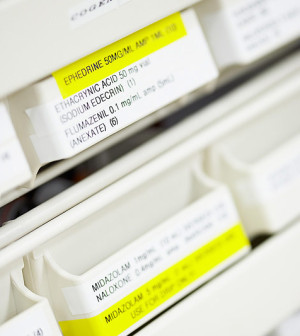- 8 Ways to Increase Dopamine Naturally
- 7 Best Breads for Maintaining Stable Blood Sugar
- Gelatin vs. Collagen: Which is Best for Skin, Nails, and Joints?
- The Long-Term Effects of Daily Turmeric Supplements on Liver Health
- Could Your Grocery Store Meat Be Causing Recurring UTIs?
- Are You Making This Expensive Thermostat Error This Winter?
- Recognizing the Signs of Hypothyroidism
- 10 Strategies to Overcome Insomnia
- Could Artificial Sweeteners Be Aging the Brain Faster?
- Techniques for Soothing Your Nervous System
Cancer Patients Vulnerable to Complications From Flu


People with cancer face a higher risk for serious flu-related complications, so getting vaccinated should be at the top of their to-do list this winter, an expert says.
“The flu shot is recommended annually for cancer patients, as it is the most effective way to prevent influenza and its complications,” Dr. Mollie deShazo, an associate professor of medicine in the division of hematology and oncology at the University of Alabama at Birmingham, said in a news release. “The flu vaccine significantly lowers the risk of acquiring the flu. It is not 100 percent effective, but it is the best tool we have.”
Pneumonia, bronchitis, sinus infections and ear infections are examples of flu-related complications, according to the U.S. Centers for Disease Control and Prevention.
It is recommended that anyone who has not done so already get a flu shot, deShazo said.
Although this year’s flu season is off to a slow start nationally, the number of cases in the south-central United States is rapidly increasing, with five deaths already reported in Texas.
And the predominant strain of flu so far has been H1N1 “swine” flu, which triggered the pandemic flu in 2009, federal health officials said Thursday.
“It takes up to two weeks to build immunity after a flu shot, but you can benefit even if you get the vaccine after the flu has arrived in your community,” deShazo said. She noted, however, that cancer patients should receive the flu shot, not the flu mist.
“Patients with cancer or who are undergoing chemotherapy should not get the flu mist because it contains live flu virus and could lead to complications in patients [with compromised immune systems],” deShazo said.
Aside from getting a flu shot, deShazo said, there are a number of ways cancer patients can help protect themselves against the flu, including:
- Avoiding contact with anyone who might have the flu.
- Washing your hands frequently with soap and water.
- Avoiding touching your eyes, nose and mouth with unwashed hands.
- Requesting that family members and caregivers also receive the flu shot.
The risk of flu-related complications decreases once it’s determined that patients are cancer-free, deShazo said.
“The longer patients are cancer-free, the lower their influenza complication risk, until it is no more than the risk of those who’ve never had the disease,” she said.
More information
The U.S. Centers for Disease Control and Prevention provides more information on who is at greatest risk for flu-related complications.
Source: HealthDay
Copyright © 2026 HealthDay. All rights reserved.










